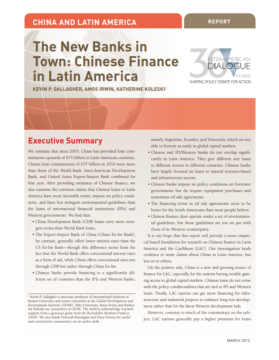The Politics Of Disaster Relief
After a 7.0 magnitude earthquake struck Haiti, the aftershock reached China in ways that few anticipated.The earthquake forced Chinese leaders to navigate the tricky politics of disaster relief.
As the situation in Venezuela continues to unfold, Phoenix TV spoke with the Director of the Dialogue's Asia & Latin America Program Margaret Myers on China's position regarding the ongoing Venezuelan crisis, as well as how China's approach to the country differs from Russia's.
“China differs considerably from Russia in that its investment abroad is largely pragmatic. It is largely economically-based decision-making. I think if there aren't clear economic, or other gains, that can be derived from Venezuela, then we won’t' see so much financial support coming from China. There are strong political ties still between the two governments, but it strikes me that much of the decision-making will be very pragmatic in nature.”
“China has been most interested in maintaining a degree of stability in the country and [until now] they [have seen] the Maduro government as able to maintain these agreements with China.”
“There’s the possibility that Venezuela will default on some of these loans. However, I do think that a future Venezuela will be largely dependent on maintaining a strong relationship with China. It needn’t be in exactly the same form, but China is the largest importer of oil, and Venezuela has the largest proven reserves of oil. There’s a natural relationship that ought to develop there.”
After a 7.0 magnitude earthquake struck Haiti, the aftershock reached China in ways that few anticipated.The earthquake forced Chinese leaders to navigate the tricky politics of disaster relief.
Hugo Chavez, the Venezuelan president, has clearly been enticed by the Libyan drama, where his longtime friend and ally, Muammar al-Qaddafi, is under siege from rebel forces.
Estimates of the volume, composition, and characteristics of Chinese lending to the region since 2005.

